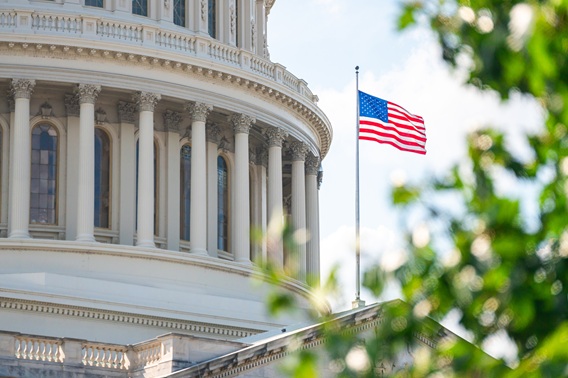Lawmakers Renew Asbestos Ban Effort to Prevent Mesothelioma
Legislation & LitigationWritten by Travis Rodgers | Edited by Amy Edel

Oregon Senator Jeff Merkley and Representatives Suzanne Bonamici of Oregon and Don Bacon of Nebraska are leading a bipartisan effort to pass the Alan Reinstein Ban Asbestos Now Act of 2025. This updated version of a bill previously introduced in Congress would ban all types of asbestos in the United States. Health experts, labor groups and environmental organizations have voiced their support.
The bill’s supporters stress its importance for closing loopholes and creating lasting protections for every American. The World Health Organization reports more than 200,000 people die each year worldwide from diseases connected to asbestos exposure. Workers and disadvantaged communities face the highest risks.
Nearly 70 countries have already banned asbestos. Yet limited uses continue in the U.S., mainly sheet gaskets for nuclear material processing at the Department of Energy’s Savannah River Site (allowed through 2037) and in the chloralkali industry (allowed through 2029).
Evidence over many decades proves asbestos causes deadly diseases, including mesothelioma, asbestosis and lung cancer. Advocates note previous steps from the U.S. Environmental Protection Agency banned only some uses of chrysotile asbestos. Other fiber types and applications continue in industries such as chemical manufacturing and automotive parts.
Legislative Timeline of the Alan Reinstein Ban Asbestos Now Act
Efforts to pass a full asbestos ban in the United States have spanned several years. Lawmakers continue to reintroduce versions of the Alan Reinstein Ban Asbestos Now Act across multiple congressional sessions. Each version aims to close loopholes and strengthen protections against asbestos exposure.
History of ARBAN in Congress-
2025Sen. Jeff Merkley, Rep. Suzanne Bonamici and Rep. Don Bacon introduce a bipartisan ARBAN bill. It bans all asbestos fibers, closes gaps in EPA rules and offers permanent protections, marking the most comprehensive proposal yet.
-
2023Sen. Jeff Merkley and Rep. Suzanne Bonamici introduced ARBAN to ban all 6 types of asbestos and give industry 2 years to phase out asbestos. The bills were introduced in both chambers but didn’t advance beyond initial committee referrals before the end of the 118th Congress.
-
2022Rep. Bonamici and Sen. Merkley reintroduced ARBAN with stronger EPA oversight and a full ban on 6 fibers. Leading health groups, scientists and firefighters’ unions publicly endorsed the measure, but it didn’t pass both chambers.
-
2019Rep. Bonamici introduced the first version of ARBAN. The House Energy and Commerce Committee voted nearly unanimously to advance it. The first-ever congressional committee voted to ban asbestos, setting a historic milestone. But the bill didn’t reach a full House vote that session.
The Alan Reinstein Ban Asbestos Now Act has faced years of reintroduction and debate. With each attempt, support has grown among lawmakers, health groups and the public. Asbestos advocates say the bipartisan bill in 2025 represents the strongest chance yet to finally end asbestos use in the United States.
What ARBAN Would Ban
The Alan Reinstein Ban Asbestos Now Act demands an immediate and permanent ban on the import, manufacture, processing and sale of asbestos. The law covers all 6 fiber types, as well as winchite and richterite, which are lesser-known fibrous minerals that remain unregulated.
Advocates say ARBAN would finally align the United States with global public health standards, closing loopholes earlier EPA rules and court rulings allowed, which let asbestos use continue for decades. The act also blocks future legal challenges that could weaken protections, delivering long-term safety for generations and making it the most sweeping asbestos legislation before Congress in more than 30 years.
Industries such as the chloralkali sector, which still uses asbestos to create chlorine and sodium hydroxide, would need to switch to safer options within a set compliance timeline. Advocates point out other countries have phased out asbestos and lowered future cases of preventable asbestos-related diseases.
The Biden administration issued a ban on chrysotile asbestos in 2024. That move marked the first asbestos ban since the 1989 EPA effort was overturned. The rule applies only to chrysotile asbestos and allows companies as long as 12 years to complete a gradual phaseout.
Alan Reinstein’s Legacy and the Fight Against Asbestos
Alan Reinstein, the bill’s namesake, was diagnosed with mesothelioma in 2003 and died in 2006. Before his diagnosis, neither he nor his wife Linda had ever heard of mesothelioma.
Linda Reinstein co-founded the Asbestos Disease Awareness Organization with Doug Larkin, whose loved one also developed mesothelioma. Together, they launched a mission to end asbestos exposure and protect public health.
Asbestos was once widely used in materials such as flooring, insulation and building products. Hundreds of thousands of people have filed asbestos lawsuits to help pay medical bills and replace lost income from asbestos-related diseases like mesothelioma.
Families experiencing secondary asbestos exposure may also file a legal claim. No safe level of asbestos exposure exists.







